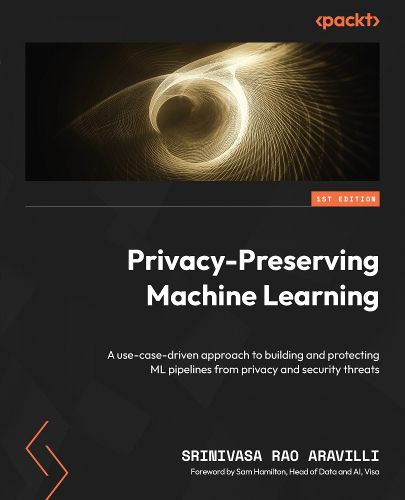Readings Newsletter
Become a Readings Member to make your shopping experience even easier.
Sign in or sign up for free!
You’re not far away from qualifying for FREE standard shipping within Australia
You’ve qualified for FREE standard shipping within Australia
The cart is loading…






This title is printed to order. This book may have been self-published. If so, we cannot guarantee the quality of the content. In the main most books will have gone through the editing process however some may not. We therefore suggest that you be aware of this before ordering this book. If in doubt check either the author or publisher’s details as we are unable to accept any returns unless they are faulty. Please contact us if you have any questions.
Gain hands-on experience in data privacy and privacy-preserving machine learning with open-source ML frameworks, while exploring techniques and algorithms to protect sensitive data from privacy breaches
Key Features
Understand machine learning privacy risks and employ machine learning algorithms to safeguard data against breaches Develop and deploy privacy-preserving ML pipelines using open-source frameworks Gain insights into confidential computing and its role in countering memory-based data attacks Purchase of the print or Kindle book includes a free PDF eBook
Book Description- In an era of evolving privacy regulations, compliance is mandatory for every enterprise
Machine learning engineers face the dual challenge of analyzing vast amounts of data for insights while protecting sensitive information
This book addresses the complexities arising from large data volumes and the scarcity of in-depth privacy-preserving machine learning expertise, and covers a comprehensive range of topics from data privacy and machine learning privacy threats to real-world privacy-preserving cases
As you progress, you'll be guided through developing anti-money laundering solutions using federated learning and differential privacy
Dedicated sections will explore data in-memory attacks and strategies for safeguarding data and ML models
You'll also explore the imperative nature of confidential computation and privacy-preserving machine learning benchmarks, as well as frontier research in the field
Upon completion, you'll possess a thorough understanding of privacy-preserving machine learning, equipping them to effectively shield data from real-world threats and attacks What you will learn
Study data privacy, threats, and attacks across different machine learning phases Explore Uber and Apple cases for applying differential privacy and enhancing data security Discover IID and non-IID data sets as well as data categories Use open-source tools for federated learning (FL) and explore FL algorithms and benchmarks Understand secure multiparty computation with PSI for large data Get up to speed with confidential computation and find out how it helps data in memory attacks
Who this book is for- This comprehensive guide is for data scientists, machine learning engineers, and privacy engineers
Prerequisites include a working knowledge of mathematics and basic familiarity with at least one ML framework (TensorFlow, PyTorch, or scikit-learn)
Practical examples will help you elevate your expertise in privacy-preserving machine learning techniques
$9.00 standard shipping within Australia
FREE standard shipping within Australia for orders over $100.00
Express & International shipping calculated at checkout
This title is printed to order. This book may have been self-published. If so, we cannot guarantee the quality of the content. In the main most books will have gone through the editing process however some may not. We therefore suggest that you be aware of this before ordering this book. If in doubt check either the author or publisher’s details as we are unable to accept any returns unless they are faulty. Please contact us if you have any questions.
Gain hands-on experience in data privacy and privacy-preserving machine learning with open-source ML frameworks, while exploring techniques and algorithms to protect sensitive data from privacy breaches
Key Features
Understand machine learning privacy risks and employ machine learning algorithms to safeguard data against breaches Develop and deploy privacy-preserving ML pipelines using open-source frameworks Gain insights into confidential computing and its role in countering memory-based data attacks Purchase of the print or Kindle book includes a free PDF eBook
Book Description- In an era of evolving privacy regulations, compliance is mandatory for every enterprise
Machine learning engineers face the dual challenge of analyzing vast amounts of data for insights while protecting sensitive information
This book addresses the complexities arising from large data volumes and the scarcity of in-depth privacy-preserving machine learning expertise, and covers a comprehensive range of topics from data privacy and machine learning privacy threats to real-world privacy-preserving cases
As you progress, you'll be guided through developing anti-money laundering solutions using federated learning and differential privacy
Dedicated sections will explore data in-memory attacks and strategies for safeguarding data and ML models
You'll also explore the imperative nature of confidential computation and privacy-preserving machine learning benchmarks, as well as frontier research in the field
Upon completion, you'll possess a thorough understanding of privacy-preserving machine learning, equipping them to effectively shield data from real-world threats and attacks What you will learn
Study data privacy, threats, and attacks across different machine learning phases Explore Uber and Apple cases for applying differential privacy and enhancing data security Discover IID and non-IID data sets as well as data categories Use open-source tools for federated learning (FL) and explore FL algorithms and benchmarks Understand secure multiparty computation with PSI for large data Get up to speed with confidential computation and find out how it helps data in memory attacks
Who this book is for- This comprehensive guide is for data scientists, machine learning engineers, and privacy engineers
Prerequisites include a working knowledge of mathematics and basic familiarity with at least one ML framework (TensorFlow, PyTorch, or scikit-learn)
Practical examples will help you elevate your expertise in privacy-preserving machine learning techniques